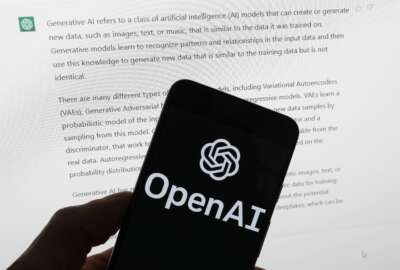Biden AI executive order calls for ‘talent surge’ across government to retain tech experts
The Biden administration is calling for a “governmentwide AI talent surge” across the federal workforce to build up its capacity to lead on this emerging...
The Biden administration is calling for a “governmentwide AI talent surge” across the federal workforce to build up its capacity to lead on this emerging technology.
President Joe Biden, in an executive order Monday, is requiring agencies to set comprehensive policies for how they will use AI tools internally to further the business of government.
The White House, in a fact sheet, said the executive order also “directs the rapid hiring of AI professionals, as part of a governmentwide AI talent search.”
Biden, speaking at the White House, said that “without the right safeguards in place, AI can lead to discrimination, bias and other abuses.”
“AI is all around us. Much of it is making our lives better,” Biden said. “But in some cases, AI is making life worse.”
Biden said his executive order provides clear guidance to federal contractors and agency programs to “prevent the bias in AI tools that can be used to make decisions on whether or not someone qualifies for housing, or benefits, or a job.”
Biden signed the executive order Monday afternoon. The heads of several agencies — including the Labor Department, the Commerce Department, the Department of Homeland Security and the Small Business Administration — attended the ceremony.
The president was also joined by Senate Majority Leader Chuck Schumer (D-N.Y.) and Rep. Ro Khanna (D-Calif.), whose district covers Silicon Valley.
Biden will meet with congressional leaders Tuesday to discuss potential AI legislation. Schumer said AI legislation is needed to enforce the executive order’s goals beyond companies with federal contracts.
“Of course, executive orders are limited, and the president and I agree, we need legislation, and that legislation will cement what the president has done, but also expand it and enhance it.,” Schumer told reporters following the ceremony.
“For most of this, legislation is required to cement it, to expand it and to make sure everyone obeys it, not just people who have contracts with the government,” he added.
The executive order, under the Defense Production Act, requires companies developing any foundational AI model “that poses a serious risk to national security, national economic security, or national public health” to notify the federal government when training the model.
“These measures will ensure AI systems are safe, secure and trustworthy before companies make them public,” the White House fact sheet states.
‘Governmentwide AI talent surge’
The executive order directs the Office of Personnel Management to lead efforts to staff up on AI experts across the federal government.
OPM under the AI executive order will provide agencies with guidance on how they can use existing pay flexibilities or incentive pay programs to attract AI experts into government service.
OPM will also lead a governmentwide pooled-hiring action, focused on bringing AI experts into agencies. The agency led a hiring event in 2021 for data experts interested in government service.
OPM will also lead an interagency working group focused on best practices to hire AI experts across the federal government.
Within 45 days of the executive order, the White House will convene an AI and Technology Talent Task Force.
Members of the task force will include OPM Director Kiran Ahuja and Ann Lewis, director of the General Services Administration’s Technology Transformation Services.
The task force will identify best practices for agencies to attract and retain AI talent across the government.
The task force will issue a report to the president 180 days out from the executive order, detailing progress made in hiring AI experts and recommendations to improve hiring AI talent.
A senior administration official told reporters in a call Sunday evening that the executive order directs agencies to use the full breadth of hiring tools, including direct hiring authority, “to get talent in the door.”
“I think it probably is a truism of our time that you can never have too much AI talent. Certainly, that’s how we’re approaching it,” the official said. “So we’re trying to get more talent across the board.”
AI.gov now features a portal for potential job applicants to apply to different fellowship programs and join the AI workforce within the federal government.
The website says agencies are looking for AI talent to “assess, pilot and launch use cases for federal agencies to responsibly leverage AI to improve government services and programs.”
The portal directs applicants to apply for the U.S. Digital Service, U.S. Digital Corps and Presidential Innovation Fellowship — programs that bring early and mid-career technologists into federal service.
Agencies, according to AI.gov, are also looking for AI experts to ensure the federal government “develops and enforces policies around AI to protect rights, safety and privacy,” as well as oversee federal research of the “next-generation of cutting-edge AI systems in the U.S.”
The senior administration official said the White House met with several agencies’ chief responsible AI officers when developing the executive order.
The Office of Management and Budget is expected to soon release additional guidance to agencies on how federal agencies should use AI in their day-to-day work.
The OMB memo, Federal News Network first reported last month, will include about 10 requirements for agencies. Those include naming a chief AI officer and developing an AI strategy for the public.
“That’s probably one of the most immediate deliverables to follow the executive order,” the senior administration official said.
The senior administration official said AI can “help the government deliver better results for the American people, just as other technology can.”
The White House states in its fact sheet that AI can help the government “deliver better results for the American people,” and expand agencies’ capacity to deliver benefits to the public and enhance the cybersecurity of government systems.
“There’s a lot of opportunity here, but we have to seize that opportunity responsibly to ensure the responsible government deployment and development of AI among other key actions,” the senior administration official said.
White House Deputy Chief of Staff Bruce Reed, in a statement, called the executive order the “strongest set of actions any government in the world has ever taken on AI safety, security, and trust.”
“It’s the next step in an aggressive strategy to do everything on all fronts to harness the benefits of AI and mitigate the risks,” Reed said.
The senior administration official said Reed will hold routine meetings with agency heads on progress meeting the AI executive order’s goals.
“We’re going to continue to prioritize this, as the president has personally directed us to do,” the official said.
AI policy ‘like running a decathlon’
The executive order is also calling on several agencies to lead AI implementation efforts more broadly across the U.S.
The National Institute of Standards and Technology will develop standards for extensive red-team testing of AI models. The Department of Homeland Security will apply those standards to critical infrastructure sectors.
The Department of Energy will also work with DHS to address AI systems’ threat to critical infrastructure, including cybersecurity risks.
“Together, these are the most significant actions ever taken by any government to advance the field of AI safety,” the fact sheet states.
The Department of Health and Human Services will also establish a safety program to receive reports of harm or unsafe use of AI in health care.
The Commerce Department will develop guidance for watermarking AI-generated content that the federal government will follow for official communication with the public.
“Federal agencies will use these tools to make it easy for Americans to know that the communications they receive from their government are authentic — and set an example for the private sector and governments around the world,” the fact sheet states.
The State Department, in collaboration with the Commerce Department, will work with other countries to establish international frameworks for ethical AI use.
“I think the breadth of the executive order is a recognition of the fact that AI policy is like running a decathlon, and there’s 10 different events here. We don’t have the luxury of just picking … we have to do all of these things,” the senior administration official said.
Copyright © 2025 Federal News Network. All rights reserved. This website is not intended for users located within the European Economic Area.
Jory Heckman is a reporter at Federal News Network covering U.S. Postal Service, IRS, big data and technology issues.
Follow @jheckmanWFED






